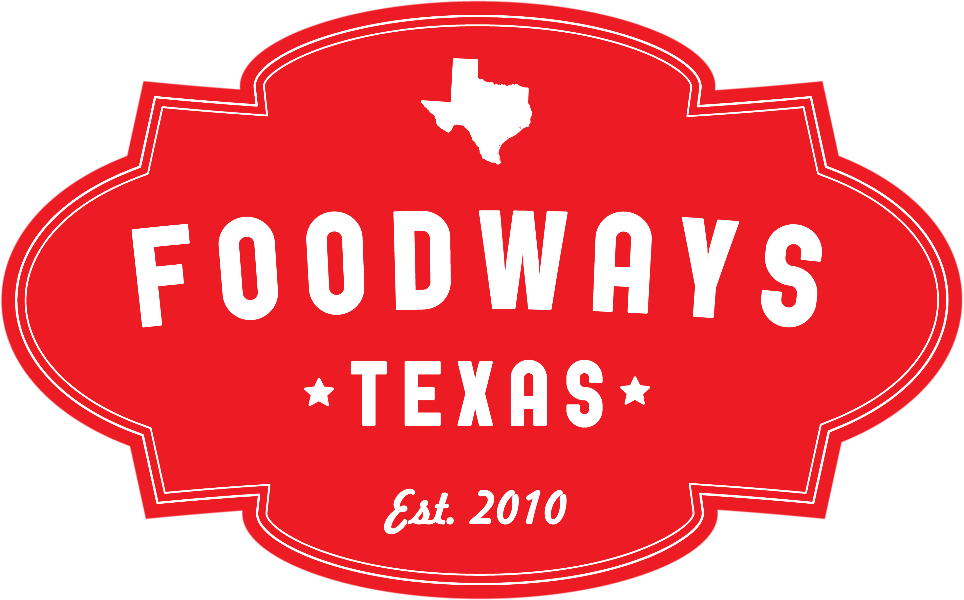Interviewer: Rien Fertel
Location: Residence of Nathan Jean (Mama Sugar) Sanders, Fresno, Texas
This interview is a production of Foodways Texas. Photos by Denny Culbert.
Nathan Jean “Mama Sugar” Sanders is a legend in the east Texas “Cowboy World” and the matriarch of a riding and roping family that bridges four generations.
Born on a farm in Nacogdoches, Texas, by the time she was twenty years old, Sanders had enough of horses, mules, and cows and set off for Houston, to work in a series of restaurants. She became a leader and cook for her riding group, the Sugar Shack Trailblazers, cooking flapjacks with homemade sugar syrup, stews, and, of course, barbecue over an open fire.
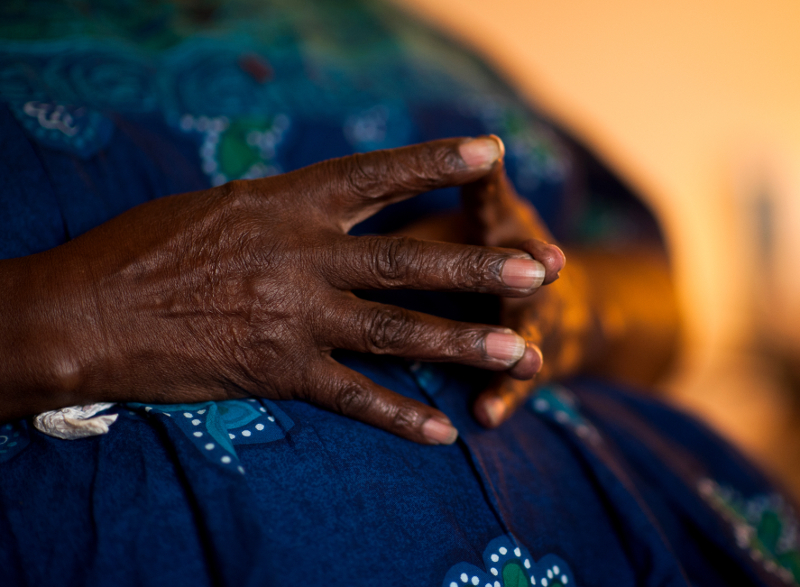
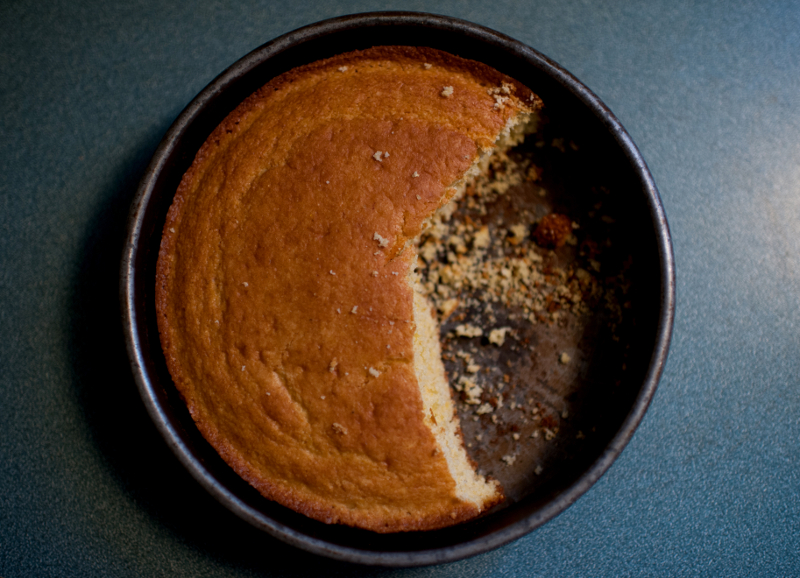
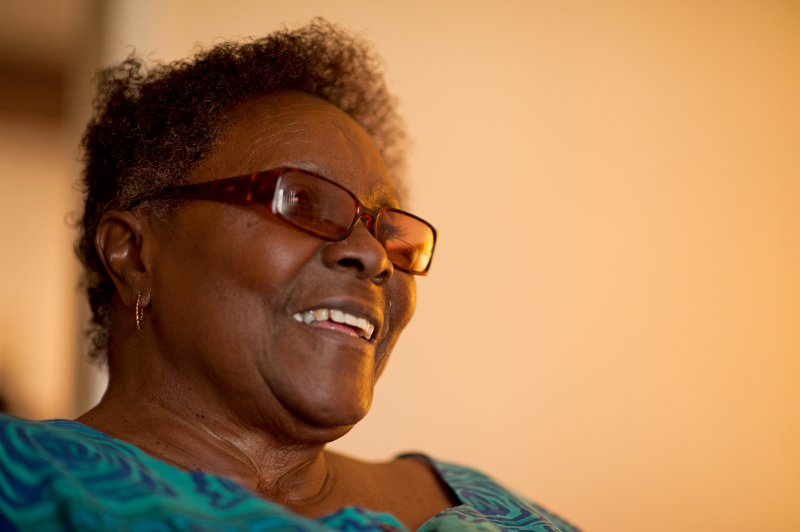
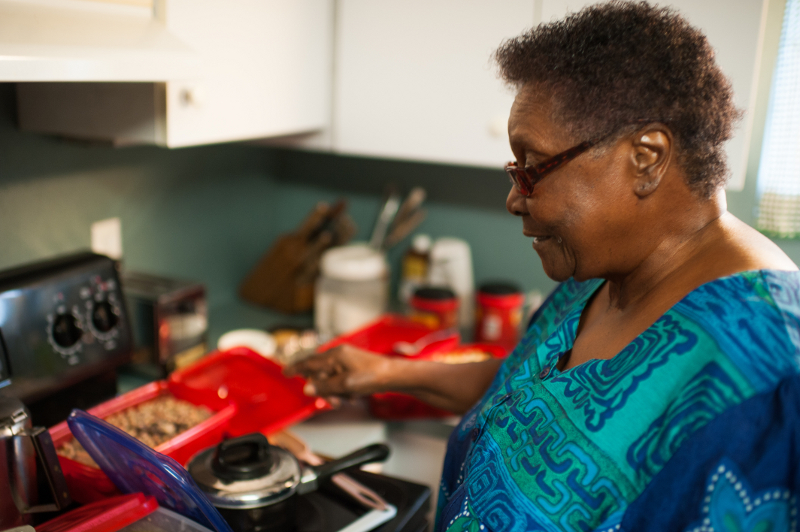
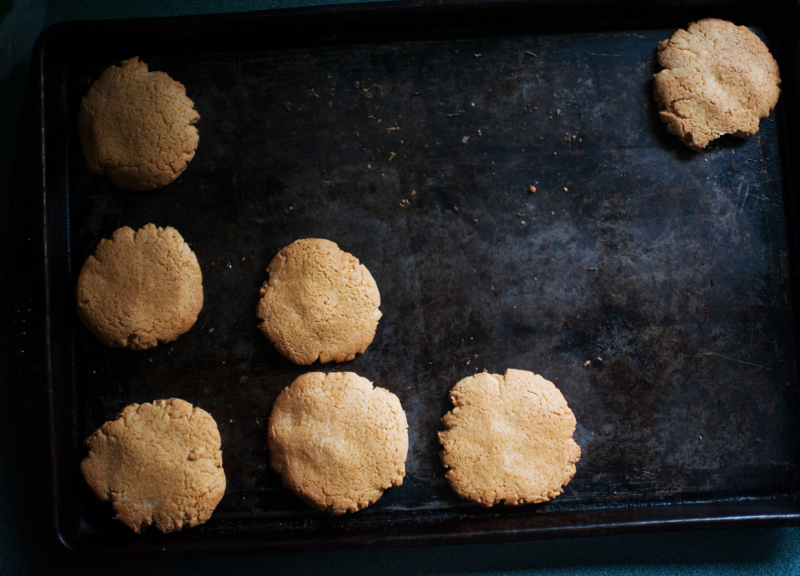
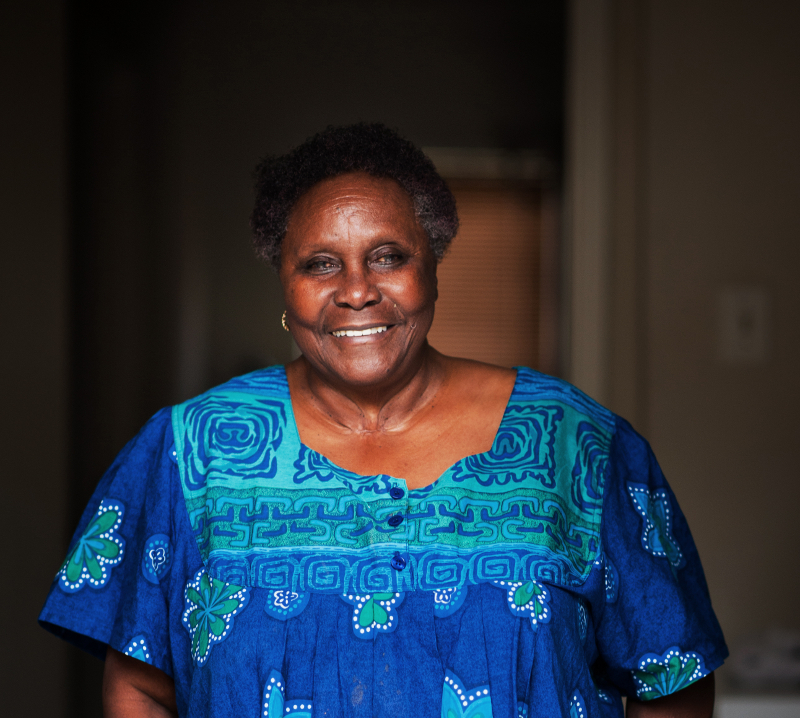
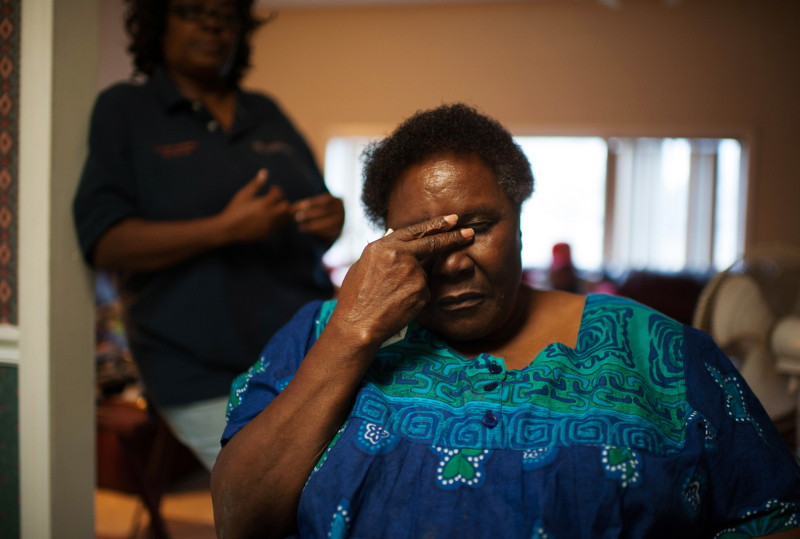
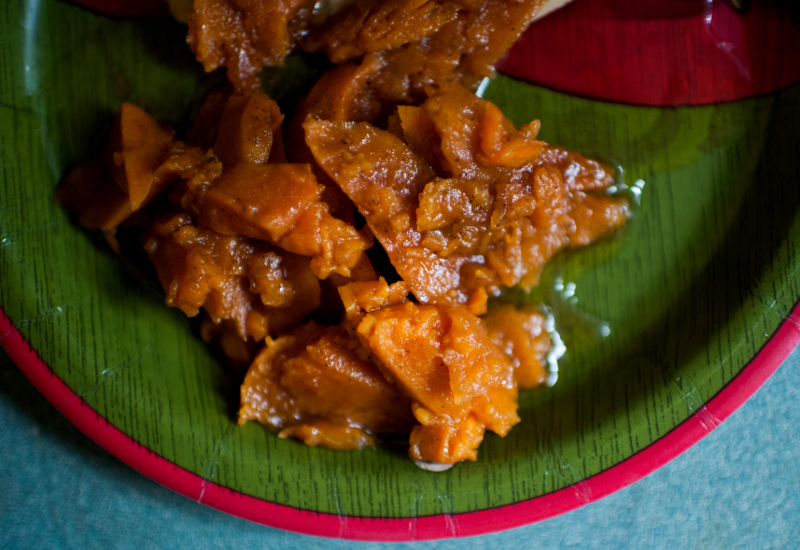
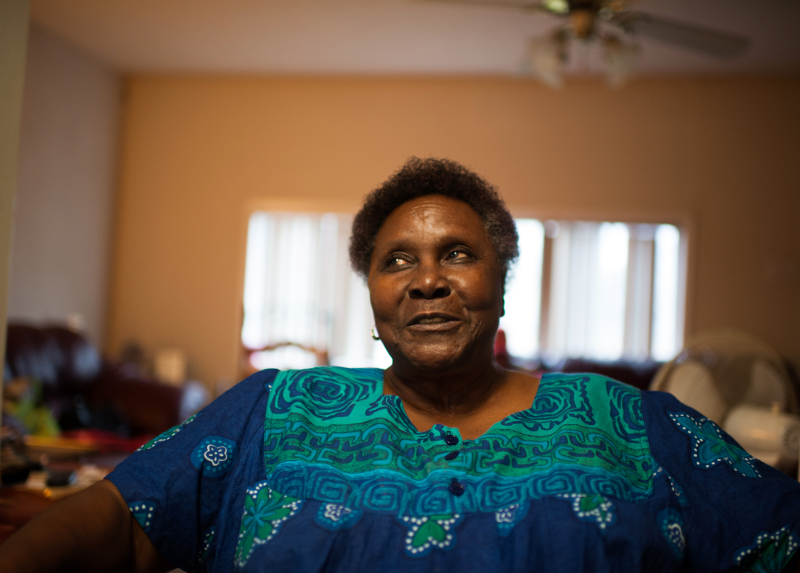
RIEN FERTEL (RF): Alright, we’re working. This is Rien Fertel. I’m working for Foodways Texas. It is January the second, a Wednesday afternoon, 2013, the New Year, and it’s 2:30 P.M. And I’m sitting in the living room of Mama Sugar, whom I’m gonna have introduce herself.
MAMA SUGAR (MS): I’m Mama Sugar, Nathan Jean Sanders, and—I’m—forgot how old I am.
RF: Well, what’s your birthday, what month and day?
MS: Six, my birthday is the sixth and the sixth and thirty-nine.
RF: So, June 6th, 1939?
MS: Uh huh.
RF: Okay. Let’s talk about first—what should I call you? Should I call you Mama Sugar?
MS: Yes.
RF: Okay. And where does that nickname come from?
MS: It came from a club I used to work at. I worked at a club down in Ocala, Texas. And I—I have five—six girls, and they would come in the club, and they would say, “Mama.” And then it just got to be “Mama,” and they would say, “Mama.” Somebody would come to her, and say, “Mama.” And they would say, “Mama at The Sugar Shack.” So, I got that name “Mama Sugar,” that way. Then I married the guy that owned the club, and his name was Sugar. He named the club; they called him “Sugar.” So, that’s how I got “Mama Sugar.” But the first began was because the girls called me “Mama.” And everybody wanted to know, “Mama, Mama Who?” And they’d say, “Mama at The Sugar Shack.” That’s how I got it.
RF: Oh, what kind of club was this? Can you describe it?
MS: When we went there, it was a disco club, when the girls and I went there. Then they got off into rodeoing and riding horses, and they got off into country and western. And then, it kind of rolled over into a country and western club. So, maybe a cowboy—cowboy dancing, trail rides would come by. And we would have rides, and they bought horses, and wagons, and—. And that’s how it ended up being a—a country-western club. And everybody came there to dance, and it was the only one in this area, where you could do country and western dancing. And play country and western music. I had a daughter that went to school, the Columbus School of Broadcasting. So, this was her training to D.J. in that club. And she D.J.’ed in that club, and she went off into country and western D.J.
RF: When did this change occur, from disco music to—or dance music to country and western? Do you remember when that happened?
MS: It was in the eighties, eighty, I would say eighty-five, eighty-six. Somewhere between eighty-five and eighty-nine. It went all, you know, we went country and western.
RF: And—and why did it happen?
MS: The girls liked riding horses, and they liked country and western music. And where I grew up, we didn’t have no regular radio stations for the blacks. So, most of the music that we could get, from where I was—was country music. And the radio station was all, like white, and they played more country and western. And that’s what I listened to, and then I introduced them to it. Then the guys that was really rodeoing, they rodeo, but they had the rodeo with the white guys. And the white guys only listened to that type of music, hillbilly, country and western, and that down-country music, over the hill music. So, that’s how they got into that.
RF: And when did you start working there?
MS: I think it was in eighty-one, that I went to the club. And I—but when I went there, it was disco-disco. And I had some guys that eventually introduced the girls to country and western. They introduced them to riding horses. And they didn’t have horses, and that was Mervis Diamond, and a lot of the guys in what’s—Mr. Hightower, and all of that. Well, I already knew about country and western. I already knew about horses, and riding horses, and doing all of that. But I didn’t—that’s why I left East Texas, because I was tired of riding horses, plowing the field, hooking the mules up, and all that kind of stuff. And so, when I hit Houston, I decided I didn’t care if I ever seen the back end of another horse.
RF: Well, let’s talk about, where were you born?
MS: I was born in East Texas, in Nacogdoches, Texas, Nacogdoches County. And I grew up in a little community called County Line, Texas, County Line. “One way in, and one way out.”
RF: County Line. What does that mean, “One way in, and one way out?”
MS: You had to go, come out the same way you went in.
RF: So, it was like—it was there’s only one road to town, and then you had to come back through the town?
MS: That’s right. We had only one road, if you kept going, you would go off into the—the rivers, and the woods, there wasn’t no where to go. You had to turn around, and come back out, the same way you went in. One way in, and one way out.
RF: So, you grew up in County Line, near Nacogdoches. What did you parents do?
MS: Farm, rode horses, and farmland. Now a cousin came from the Army, and bought this wagon and horses to pull corn and do the fields with. And he had—he bought a wagon with four horses. A red big wagon, and he brought it there, for his Daddy to use, and for me. And I drove the wagon, and drove the mules, and drove the horses, and I did all that. The corn—I would pull the corn, pick cotton, wild nuts, and all of that. And, as I—I remember my cousin, put me in that wagon, the first time, I’d never driven with the six horses, or four horses. And he put me in it, and they came out of the field, and went over a fence. And I was driving it, and they ran off. And after that, then I guess I started driving, before I could drive four horses. A wagon with four horses hooked to it.
RF: How old were you?
MS: I was like ten. I was about ten years old, at that time, I never forgot it though.
RF: What was your cousin’s name? Who put you on the horses, or, on the wagon?
MS: Ordis D.
RF: So, he—he kind of taught you how to do certain things around the farm?
MS: Yeah, he helped me too, but my uncle was my most to do the farm work. And his wife was named, Tennessee. And Tennessee Whitaker, her maiden name was Session. She came from the Session heritage. And she did cooking. She wasn’t a very good cook. She was a country cook, but she wasn’t a very good cook. All of my cooking came from Nacogdoches, when I finished high school. I left Nacog—I left County Line, and went to Nacogdoches. Got a job. And the job I got was at a boarding house. And the lady was named, Ms. Grant. And she taught me all of my cooking. And I had an Auntie named Veita [?], and that was my Mother’s sister, and she was a good cook. And she taught me to cook. But between Veita—Aunt Veita and Ms. Grant, that’s where I began to cook. That’s where my Auntie that I grew up in the country with, she wasn’t a very good cook. [Laughter] She could cook, but her cooking wasn’t that exciting at all. [Laughter]
RF: I want to know about the boarding house, it was owned by Ms. Grant? That was her name?
MS: Uh huh.
RF: Tell me about her.
MS: Ms. Grant was a very—she was a very interesting lady. And she boarded people, like you came into town, and get a job, and you were gonna stay, you know, a few days. So, you stayed there. And I went in in the morning, and got everything together. She taught me how to do every—you know, how to cook. She even taught me how to fry chicken in a way that I really didn’t know. And I remember one time, she came, and she had all of these, this food—this squash, a whole thing of squash. Well, I didn’t know the difference between a squash and a gourd. And I, cut this squash up, and I cut that gourd up. Boy, that squash was bitter. And she got all upset, and everything. But I stayed on there, she was a lovely lady. She boarded people, and cooked for them. She’d fix breakfast and lunch. She didn’t do dinner hardly, unless you were living there. If you were living there, she did dinner. But I did that part. But she taught me how to do it. She could make a syrup pie, and it wasn’t anything in it but syrup. And it was delicious. She—but, it’s—it’s all—it’s like a pecan pie, only thing is you just don’t put the pecans in it. And it took me a while to find that out. But she taught me most of it. Then I had my Auntie, she would cook—she called it, “Chestnut Pie.” And it was made with eggs, mostly eggs and milk. And we wouldn’t eat it, because it was made with eggs. But she called it, chestnut. So, then we started eating it.
RF: Oh, because, oh, you didn’t like eggs?
MS: I—I didn’t like the taste. I thought it was eggs, made out of eggs. Not that I didn’t like eggs, but I didn’t want to eat that egg pie—that pie without all the eggs beat up in it, and cooked in there, and then we wouldn’t eat it. And when she stated calling it chestnut pie, and maybe she sprinkled a tad of coconut or something on it, and it was the same thing.
RF: And your aunt, did she just cook for—for home, for her family?
MS: Just cooked for her family, but, baby, she could cook. That lady could cook. She’s dead and gone. But she was a beautiful cook, she could cook.
RF: Let’s—let’s talk about your introduction to what you call the cowboys, the trail riders? Did that happen in eighty-five, at the club? Or, did—did you know about it? Were you introduced to this culture before?
MS: I always knew about horses, cows. I always knew about that—the horses, and, you know, riding horses, hooking up wagons, and harnesses and stuff like that, I always knew about it. But like I said, when I was coming up, we didn’t have the pleasure of getting on a horse, and going down the road, just going on a trail ride. When you hooked that horse up, you had to go to the field. We was going to plow, or hook him to the wagon and go pull corn. Or go get cotton, or something like that. That’s what that horse was for. And then when I got introduced to the Cowboy World, I didn’t want it, because I was tired of horses. I was tired of cows. I didn’t want any of that. But having five girls, and being a single mother, because my husband and I separated. And I decided that this is what they wanted to do, that I would do it, you know. I would go along with it. So, Mervis Diamond and Ted Hightower, and then I was introduced to the girls, and that is what they wanted to do. Then I came back with it. But, I didn’t, you know, it wasn’t my thing.
RF: So, your daughters pushed you in—into this? In a way.
MS: Yeah, they pushed me into it or whatever. They was interested, then I had to be interested. That’s what that was all about. That’s what they wanted to do, and Cowboy World is a tough world. You had these guys out here, out for everything, so, I had to be with my girls. Beverlyn was the only one that was out of school, I think. I think she was the only one that was out of school. And her and Sherry, because they came out a little behind each other. But they was about—Sherry was in Prairieville, I believe.
RF: So, what appealed to your daughters—if you can speak for them—what appealed to your daughters, about what you called, “The Cowboy World?” Was it the horses, was it the trail rides? Was it the cowboys? What was it?
MS: It was the horses, they got interested in the horses, I think, Catherine, Vanessa, they was the babies. And they really got interested in horses. They wanted to ride—they’d see the cowboys riding horses, and these womens riding horses, and they wanted to ride horses. So, that’s what interested them in it. So, when these guys came out, and asked them, “Y’all want to ride horses?” “Yeah, we want to ride, we want to ride.” And so that—they wanted to ride. And Ted told them, “Y’all come out to the Diamond L.” I don’t know if you all remember the old Diamond L, or know anything about it. They started at the old Diamond L out on South Main, Ted Hightower was born. And he would let them ride their horses. And then the guys, they was like, some of them was in high school and stuff. And some of the guys would let them ride their horses, and they didn’t know how. Those men were, “You ride my horse, you’re going out with me tonight.” And I just kind of got tired of that. And then after I met Ron Sugar, he went and bought this little pony. And we had five girls and one pony. And they started. So they had to do that. And then, but the guys, they would let them ride sometimes. But if another other one—I had young kids, and they was young on the cowboy scene. So, some of those other womens on the cowboy scene was older. And if they could get a hit out of them, they would take the horse away from my girls. So, that’s how we, you know, and let them ride. “We’re going out tonight with this lady, so you got to let them ride my horse.” So, that’s how they got—then we ended up getting more. Then we ended up getting—I got interested. “So, if I’m gonna do this, I’m gonna do it.” So, we went and got the wagon. And then we had—one of my daughters, a guy bought her a horse. Then he wanted to take it back, but he couldn’t take it back because he had given it to her. The law said he couldn’t take it back. So, then the other one was scared of horses. I had one who was so scared of horses, and they took her, and put her on a horse. And she hollered and screamed. Then she saw all the interest that the other girls had in the horse. She decided, “Well, I’m gonna do something.” She decided she was gonna ride the wagon. She got with Mark Hatfield, and some of those guys, and she wanted to ride a wagon. So, she became the muleskinner. But first she—they didn’t want to fool with her: “You scared?” Hatfield told us that, “Bev, you scared? Y’all don’t want to ride? Can’t tell you nothing.” And one time he got behind the wagon: “You’re just stupid Bev, you’re just stupid.” Bev got out there, don’t know where she got that gun from. She got that gun on him, Hat—and her boyfriend, she pulled that gun out, and said, “Y’all are gonna teach me how to drive this wagon.” And they jumped back up on the horse, and said, “Come on, we’ll teach you.” [Laughter] So, she became “Number One Girl, Lady Muleskinner.” They taught her how to ride.
RF: Can you describe—what do you mean by “muleskinner?”
MS: Driving a wagon. And muleskinner, you know, your knees go this way, this way, this way. So, sometimes it’s rubs the hair off your back, if they don’t do it right, so. That’s why you call it muleskinner: right, left, right, left, like this.
RF: Can you describe—for those, who might listen to this, and have never heard about local cowboy culture—can you describe what you’re talking about? What it means? Where it comes from?
MS: Well, it comes from, as far as I know, it comes from back, way back, as far back as I can remember. And it’s always been horses. And the Indians rode—my grandfather was an Indian—they rode without anything, saddles or anything. And if they caught one out there, it was there’s. Then the cowboys came in, and they invented—they got saddles, and different things like that. So, that’s the way I came about, knowing about cowboys, that’s where it came from. And they did the cows. We had cows. We had to round the cows up. And, you know, all your animals, you had to bring them in. And then you had to mark your stuff. The cows, and some people even brand their horses. But, it was, you know, all about yours. Then you had to do fences, so you would have yours. And you had to ride the fence line, to make sure your fence was up. Then you had your cows you had to milk. And you had your little calves, and stuff like that. So, as far as I’m concerned, that’s where cowboys came from, way back. That’s as far back as I can go, is cowboys, and cowgirls. And, now they tell me, that it was said “cowboys,” because the black folks worked the—worked the cows. And they would say, “Go get that cow, boy.” You know, the white man would tell the black boy—the black man—they called all black people boys. “Go get that cow, boy.” Or, “Go bring that horse in, boy.” “Go feed that cow, boy.” So, a lot of that came from that. For us, the black folks, we was all called “boy” and “girl.” So, that’s as far back as I can go with it, the memory that was told to me, from my—my family. But then it became cowboy, everybody ride horses, you’re a cowboy. You had spurs on, you’re a cowboy. So, everybody’s a cowboy now.
